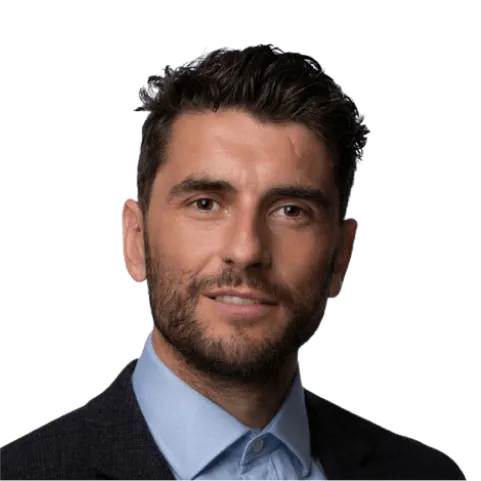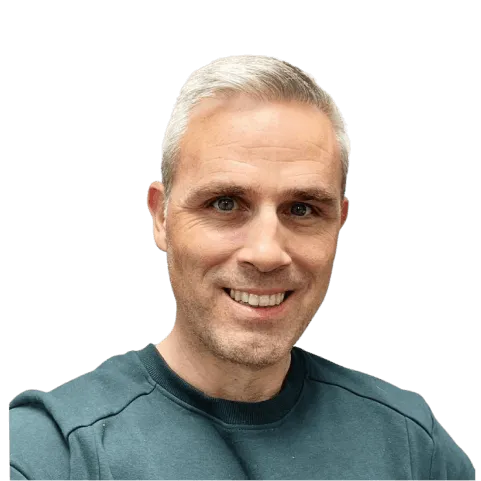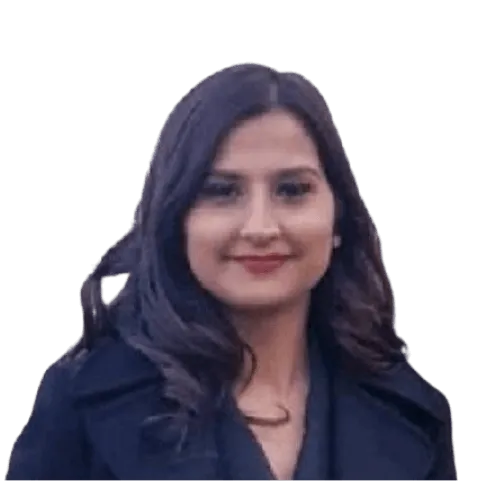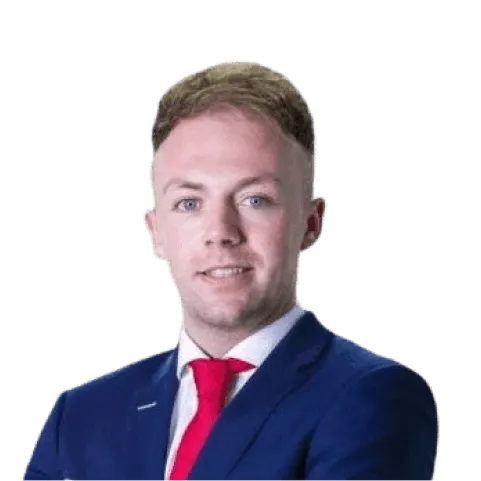


Key Points
Our three big takeaways from Niall's conversation with Helen on career paths are
- It's OK to want to pursue and unconventional career. Go after it and make it happen.
- Communication is key - like you're talking to a 13 year old, never condescending but always informing
- Your job is not your identity. Keep them separate and it will be easier to focus on your priorities.
Let us know what you thought of the episode?
Transcript
Helen Curran
I always wanted to be on TV, and to be a TV presenter. At the time when I was young and naiive in school, I was always big into drama and singing and, being on stage, I loved it. It was the right path for me.
And of course, the career guidance counselor said, ‘you can't do that. It's not a real job’, you know, ‘you should be a lawyer’ or whatever, I was really good at debating. I was on the Irish debating team, because I was really good at Irish at the time in school. She was like, you should be a lawyer, you'd be really good at either debating cases.
I didn’t want to be a lawyer. And I definitely didn’t want to study for that.
I really wanted to pursue entertainment and communications and stuff like that.
I'm from a family of seven children. And I'm the youngest. All my siblings had done quite well; there are six years between myself and my sister next to me.
Three out of four brothers went to University College Dublin, my sister went to the University of Limerick, and I didn't really want to do that. I wanted to go to college to do a really good communications course.
My dad pushing us to do kind of go to UCD or a proper University as opposed to a community college, he had a big influence on my life, my dad. So, I thought, ‘oh, well, I better do what he says’.
I applied to UCD and decided to do an Arts degree and during my time doing an arts degree. I felt if I do Irish, as part of my degree that might help me get into RTE (Radio Telifis Eireann, the national broadcaster in Ireland) which was near UCD.
In my head I was thinking this might work out.
In first year in UCD, I wrote about six letters to RTE and I got a week of work experience and with the variety department.
At the time, Niall Matthews was head of the operations in the department and the manager above, Sharon Delaney was fabulous.
She really nurtured me that week and showed me everything and introduced me to so many people.
Before starting I went down to Dun Laoghaire shopping center and I made myself 50 purple business cards with my name and my address on my home phone number. Anyone I met I just gave them one of my cards and I said I really want to work here, I'll do anything I'll make the tea, whatever.
Two producers, ended up calling me to come in and basically make the tea and be a runner.
And then, and one day, we were on set on the studio floor and one of the cameraman said ‘Oh, Helen, there's a an opening for a new continuity person, you should go for it’
I was like, What the hell is continuity? He explained to me this would be a great stepping stone. I went up to the head of departments at the time, delivered my CV and got an interview. So that's kind of where that started,
Niall O'Carroll
I think it's important for people to kind of understand that you don't just rock up on the day and someone goes here's the script.
Helen Curran
It might sound like some people just hop off the 46a bus and come in and introduce something. You go through a lot of training. I was freelance at the time.
I used to go to college during the day, and then I’d do midnight shifts in continuity, or I'd come in every weekend. Then when I left college, I loved marketing and I was quite good at sales. I went to a few different marketing companies promotional activities and things like that.
I was doing all that after college and still working freelance in RTE as a continuity announcer so I was working all the time. I'd be in marketing from seven in the morning to seven in the evening, then I'd be in RTE at the weekends. It was just to try and you know, figure out really what I wanted to do.
Eventually, in 2002, my boss said, ‘look, this is the last time I'm going to offer you this because it’s not going to come up again. It's a permanent contract’ because she had offered it to me a few times. And I said no, I liked doing the freelancing.
I talked it over with my family and my dad said ‘Oh, you have to take the permanent and pensionable job’.
I’ve been full time since 2002. Since then, one of the weather girls left. And my boss had said to me, ‘would you like to train up on the weather?’ RTE had come off the in-vision continuity at that stage as well. So, I turned up on the weather. I can't believe I'm there 24 years.
Niall O'Carroll
But barring the obvious what was the fundamental difference in training up on the weather would say from being a continuity presenter?
Helen Curran
Training up on the weather there was a big difference, because with continuity, you're writing your own scripts, you had to be really creative. You have to try and get promotional information and information about a show without giving the show away, within a 10 seconds link. It's challenging, and then it was really fun. I still do continuity about once a week. It's good to keep your creativity going.
With weather, you're given the information but you have to try and manipulate it in a way that you're keeping the facts,, but you have to give it in a way that the audience are going to be able to understand. You can't use meteorological terms that the audience won't get.
I always try and think of it that I'm like that I'm talking to my 13 year. You don't want to be condescending, but you want to be informative in a way that they'll understand it.
We don't have autocue in the weather studio. It's really interesting when people come in for visits, they're like, ‘where's your script?’ They're two-minute bulletins and sometimes three-minute bulletins, you know. So that's a whole other skill set to learn.
Yeah, so it's learning it off by heart. You might get your script 40 minutes before so you have to manipulate the information into understandable words for the public, learn it and rehearse it. And so it's a totally different set of skills. And so, yeah, it's good.
Niall O'Carroll
Terrifying, I would say, but good. Yeah.
Helen Curran
Yeah, I mean, I like I loved it from the start, I, it was really exciting for me to train up on the weather. And I think that's why I'm still doing it. And now I'm training new people in so, it gives it that extra bit of excitement then as well.
You get to kind of impart your knowledge, but without making them sound like you. You want them to stay themselves; they're picked for a reason to present the weather. You want them to keep that essence of their own presenting style. Yeah, it's good. I love it. I love my job. I'm so lucky.
Niall O'Carroll
You are lucky. But there's also a really interesting aspect of your story, and it's something I can relate to it because I was the same.
I was doing the job. That just wasn't me. It was great job. And I had some great friends, I still have some great friends doing it. But it just wasn't me.
I went back and I did my degree, and I did my masters. And then I took a gamble on sending an email to one of the most successful as far as psychologists in the world outlining I was looking at the whole area of athlete transition at the time. I had my thoughts on an angle. And this is before athlete transition became quite a popular conversation piece.
I read his book doing my master's, and he was the head of department in the university in Canada, and I just took a gamble on sending an email to thedepartment for his attention, never thinking that it would ever get a response.
About four weeks later, I got an email back and next thing, we had a phone conversation, he kind of felt like I was coming at it from a different angle. Suddenly, we were in this kind of conversation relationship.
Eventually, I was invited over, I met with him. He was working with all the top Olympians in the country at the time. And suddenly, opportunity started to arise because I took that gamble in sending that email.
When I went to Canada was like on LinkedIn, and I was sending people messages, and I was constantly networking.
I think it's a really powerful message for anyone in work today is that kind of idea that there's something you desperately want to do, then you go on, make it happen.
There's this myth that you always hear propagated, but kind of, you know, if you work hard enough, you'll be successful. And that's a lie. Because you need luck. And you need, you know, certain things to fall into place.The reality is, if you don't work hard at all, you'll never be successful. Hard work is essential. But it doesn't guarantee success. There's got to be extra layers.
You've gone off printing your own business cards and handing them out and sending emails every week pestering people. There's another interview I've done for this podcast with an author called Christian Bush, who's based in New York. Christian is the best selling author of a book called the Serendipity Mindset.
He talks about serendipity in a way that is just so cool. Really, what he's saying is that every opportunity we have in life gives us an opportunity to open a door to change our reality. Whether it's a relationship, whether it's work,
I love that you just never know when you meet someone how that's going to influence your day, the week or month or year. I think that's a really positive message.
You've done a lot of things in your life. I think we get defined sometimes by one aspect of what we do. And my philosophy around transition is all that is that the fundamental key to any athlete or anyone transitioning out of a career is that their identity isn't tied to that one thing.
If you have a significant change in career or life, and your whole identity is built around what it is used to do. There's a serious danger then that you, the person, gets lost in it all. When I spoke with athletes, it would be my first questions that are when I was doing the research for the book was ‘Who are you?’
And their response would be I used to be a footballer, I used to be a rugby player, I used to be an athlete I used to be, I used to be...
So, if I was asking you now who Helen Curran is? How would you answer that question?
Helen Curran
I think, my family definitely is what drives me. Being a mom is, is first and foremost what drives me. I love being a mom and a wife, above everything else.
My career is definitely second to my home and my family. Something that defines me would be that I'm quite a caring, kind person. Myself and Steve, and the kids moved in with my mom and dad a few years ago, because my mom was starting to develop dementia. We moved in to help out and save money for a deposit on a house. When my mom went into home a few months later, we got our mortgage.
But, one of the reasons we helped mom and dad also, I think it’s really good for the kids to get that emotional side of things. They're very caring and empathetic now towards elder people. And they're very kind children as well, you always see them with older people offer to help or get out of the way for them.That will be something that defines them as well.
Myself and one of my sisters are the only two who lived near my dad now. We'd help him a lot. I'd see my dad nearly every day; either dropping them some dinner or, you know, doing the shopping or something.
And then my husband's Mum, his dad died two years ago. So we moved his mom up near us, so she lives down the road as well. Last Sunday, I did a roast and I did a Meals on Wheels for my dad, his mom and my sister.
So, what drives me is my family.
I used to want to be famous… I thought I wanted to be famous. Now.. that doesn't even interest me. I don't put myself out there at all. Even the fact I'm on LinkedIn is amazing, because I just don't do the publicity thing that often, I don't go to the openings of things, I don't do the magazine interviews and stuff like that.
Niall O'Carroll
That's really great answer. And it's actually a major reason why I wanted to talk to you is because when you have people in the public eye that are constantly doing interviews, there's very little scope for anything new in a conversation.
But because you aren't driven in that direction. It means that anything that you share is kind of fresh, and it's new, and it's different.
What greater words to define yourself than being kind, it is such a lovely way of living your life.
One thing that you said there that really resonated with me was when you talked with your mom and her challenge of dementia, because my dad, and he had, you know, various serious illnesses. And at the end of his life, he got what I would describe as a watery diagnosis of dementia.
I'm not convinced it wasn't the drugs he was taking that his mind just started to go. But the fact is, his mind started to go. And it was incredibly difficult for my dad, he was such an intelligent man. I mean, he's the guy who drove me to read and, and he ends up getting a reference in pretty much every interview I do at the moment, because he only passed away recently.
But the point is these relationships are what define you. He was an incredibly kind man, and I've never met anybody who saw the good in people like he did. But the fact is that you're going to these challenges in your life, you still have to function, you still have to get on with life. And whether the distraction is an email, or a phone call, or a deadline or something that you've just hanging over you, or whether it's huge, like an addiction or a loss of a loved one. You know, distractions come in different forms. But the reality is if we want to continue to function in our environments, we've got to be able to manage them.
So when you're dealing with your mom, and her gradual decline with that awful illness, and you're dealing with your dad and the worries for him right now with this pandemic and the fact that it is particularly challenging. And yet you've got to appear on screen smiling, well presented and just get on with it. So how do you channel yourself into this area where I've got to go on TV and smile and present this with all the pressures and stresses that are going on in the background
Helen Curran
Yeah, good question.
It's really about just separating them completely.
My job is just my job and and and while I love my job and I went through a period of absolutely not enjoying my job at all due to one person. They made it miserable for me but since they left my job has become a whole new thing for me again and I love it. It is just a job at the end of the day.
I mean my priority is home, being with the kids you know making sure my dad is okay making sure my mother is all right.
I just think communication is one of the biggest most important things in any relationship whether it's with my husband or with my family with the kids or whatever I just think talking is just so important.
My kids know that I have to work some nights and I'm not there to say goodnight to them or I'm gone already in the morning so I'm not here to bring them to school. But they know that it's my job. But if one of them is sick or they also know I'll be there for them and I'll say to my job I can't come in today because this takes priority.
I get days where I'm really upset about my mom, she was absolutely my best friend. I talked to her about everything. I'm the only one of her kids whose children live in Dublin so my mom always saw them growing up and I'd have her over for a cup of tea and we just have a chat or we might go shopping or we go to the cinema or whatever. To me, I've lost my mom and that's and it's really, really hard someday.
I go into my job some days and feel a bit robotic. And then I suppose even though you might have felt awful that morning and you didn't want to do it, you go in and you do your job and it's nearly like an endorphin you know you do feel better. You come home and you're feeling a bit better at the end of the day. You're not wallowing anymore.
My main thing is really just separating them completely home life is my favorite thing. I love being here with the kids and my husband and then work at the moment during lockdown work is a nice escape. Even though I don't see anyone we're completely alone in the studio. So we mount the camera, the lights, the microphone, the recording equipment, so we do it all ourselves.
I think just separating them is my biggest thing.
Niall O'Carroll
I think that's such an important message. And it is particularly difficult for people to separate because work and home life are happening in the same room.
Helen Curran
I really feel for people who are on their own at the moment having to work from home. I think that's so difficult for people and it's important for them to keep their mental health strong. I'm so lucky that I have my job still and nothing has really changed other than the fact that you can't really socialize with anyone. I'm so lucky that I can come home to my family life. I'm sure there are families there who just don't want to be around each other this much.
Niall O'Carroll
It's great to get to spend time with people that you're you enjoy spending time with. And I totally get it, mean I’m working from home on my own, I'm very fortunate. Where I live right now is very close to where my kids live, so they can pop in and out whenever they want. But it is massively challenging.
You mentioned briefly there, a person at work made it really challenging for you. And I wonder knowing what you know now would you have advice for the younger you about those days, because I think an awful lot of people have challenging relationships at work.
Helen Curran
I think I probably say to myself, talk to someone else about it; not a boss or HR person or anything like that, a colleague that you might not even be that close to, because you might find that they're going through it too.
And, I would say to myself, just don't take any shit. Stop thinking that you're worthless. Because you're not.
That's how I felt. I felt like I shouldn't be there.
Even though I know now I absolutely did.
And I worked hard to be where it was. So, some advice I'd give to anyone listening now would be absolutely don't take any shit from someone else, they've no right to make you feel like that.
I wish I would have been stronger back then to deal with it better. It's, it's probably made me stronger in the long run. I think as well, as you said, life isn't perfect. I wouldn't like life to be perfect, because you can't learn from anything, then you have to make mistakes to get better.
And that's the kind of message that we give to our kids as well. It's okay if you're not getting A's in school, that's not what we want from you. We want we want you to feel comfortable that you can do the work, and try as much as you can.
My big thing, though, in a work situation, definitely don't take any shit. And don't let someone make you feel like that, because they have no right to make you feel worthless and bad about yourself.
Niall O'Carroll
Absolutely. Making mistakes are the things that make you better at what you do. Instead of beating yourself up over it, or allowing somebody else to beat you up over it. If you don't make mistakes, that means you're not trying anything new, you're not doing anything different. You're just in your comfort zone.
Helen Curran
And owning the mistake. So many people in work know they've made mistakes but pretend ‘I don't know what happened’, or ‘someone else did that’.
Own your mistake.
Niall O'Carroll
I wish you success in whatever you decide to do. It's been an absolute pleasure chatting to you
Helen Curran
Thank you so much.
Latest Episodes


See PepTalk in action











